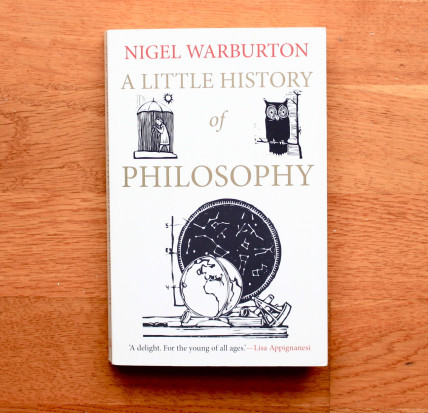
ISBN: 9780300187793
Does what it says on the tin. From Socrates through to Alan Turing and Peter Singer, bitesize chapters relate the history of philosophy from its birth to present day. You couldn’t call it a full history, since it focuses primarily on Western philosophy. Nevertheless, it is a lovely introduction to philosophy for students or for anyone with an interest in the subject. These philosophical episodes also coalesce with pivotal moments of political and scientific change: Rousseau in the French Revolution, Charles Darwin’s theory of evolution, Karl Marx theorising Communism, Alan Turing cracking the Enigma code. Joining the philosophical dots through history helps to paint a picture of humanity and continued attempts to improve ourselves.
The tone of the chapters evolves as you read. Warburton is almost flippant and comedic at the start, when discussing Socrates. But this may well be a reflection of the ancient historical accounts we have access to. The erosion of time has made them into characters, rather than people. You cannot help but find Pyrrho to be an amusing character. Pyrrho was an early sceptic who believed we can know absolutely nothing. Our physical senses were likely to mislead us, so he therefore ignored them entirely.
“So, whereas most people would take the sight of a cliff edge with a sheer drop as strong evidence that it would be very foolish to keep walking forward, Pyrrho didn’t … Even the feeling of his toes curling over the cliff edge, or the senstation of tipping forward, wouldn’t have convinced him he was about to fall to the rocks below. It wasn’t even obvious to him that falling on to the rocks would be so bad for his health. How could he be absolutely sure of that?” p17
As the book moves further toward the present, the tone becomes more sincere and the questions more relevant for a modern reader. Will computers be able to achieve consciousness, for example? Is abortion moral? Reading this book is like studying a unit called “Introduction to Philosophy,” with lectures from a university professor (which of course they are). Studying Socrates and Pyrrho give you a flavour of philosophical thought, but their insights are unlikely to impact on modern day life. Warburton fulfils his role as teacher by introducing an increasingly provocative style that encourages the reader, or student, to explore and question.
Share this:




